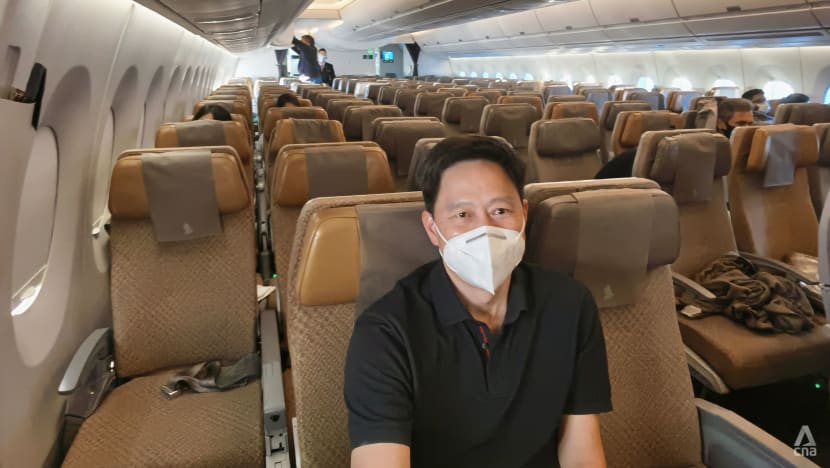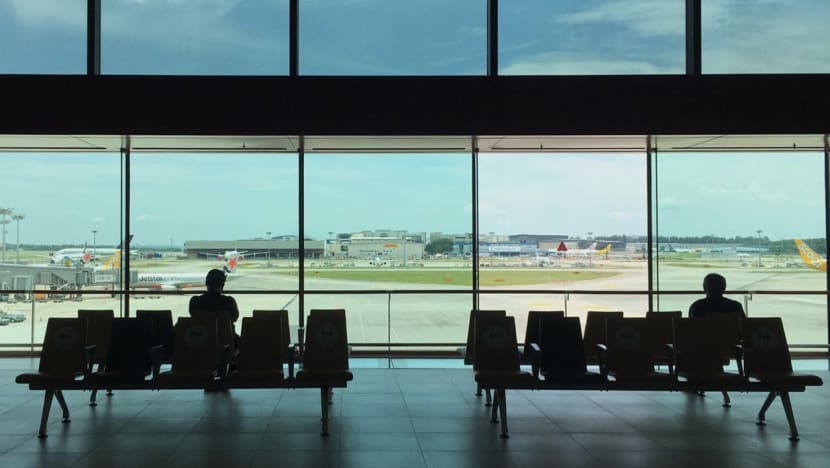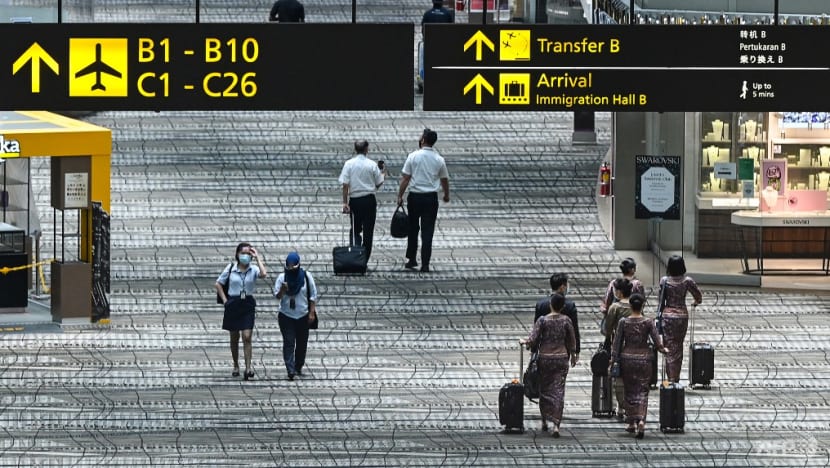Commentary: Flying to Germany for holiday – many things must align for trip to happen
After 18 months of border curbs, leisure travel is finally opening up but authorities have to mount special efforts to provide peace of mind to attract tourists, says James Cook University Singapore’s Professor Abhishek Bhati.

SINGAPORE: Singapore welcomed the first visitors from Germany under the vaccinated travel lane (VTL) scheme last month.
More than 1,000 have travelled between Singapore and Germany in the weeks since.
The VTL is the latest measure from Singapore to revive travel for many vaccinated travellers between Germany and Singapore and from Brunei to Singapore with no quarantine restrictions.
This is an improvement on the Reciprocal Green Lane (RGL) - without a controlled itinerary or restrictions on the use of public transport. Even opening the now cancelled Singapore-Hong Kong air travel bubble (ATB) scheme required both destinations to have a stable COVID-19 situation marked by few unlinked cases.
Transport Minister S Iswaran said such schemes will be expanded. The important question is whether these different travel arrangements are effective in reviving travel between countries and to what extent they can lift economies.
The business community is optimistic. About 70 per cent of respondents polled in a Monetary Authority of Singapore (MAS) quarterly poll published in September cited the prospects of reopening borders to international travel as a potential growth driver.

MIXED REACTIONS TO TRAVEL PROSPECTS
But what about the man on the street? Would the average pre-coronavirus leisure traveller in Singapore be game to try out the Singapore-Germany VTL?
Interestingly, a CNA story on Steve Chia’s recent travel to Germany generated a stream of online comments - with mixed views about travelling overseas.
Some were excited about the hopes of going on a first holiday overseas in 18 months while others were sceptical – about safety, the actual costs of airfare, accommodation and sightseeing, the ease of getting polymerase chain reaction (PCR) tests in Singapore and Germany, insurance and more.
Social media reactions show the general public is still uncertain about health issues and fearful of consequences if they test positive in a foreign land.
There is sufficient evidence in current academic literature to label this behaviour as post-pandemic “travel fear”. There is even a German word for it coined by famed psychologist Sigmund Freud more than a century ago: “Reiseangst”, or travel anxiety.
FEAR OVER TRAVEL IS TO BE EXPECTED
It is normal for people to be more fearful during uncertain times. The unpredictability of travel and possible delay in returning home due to unforeseen developments may discourage travel.
The biggest concern surrounds the implications of testing positive for COVID-19 while in Germany. Questions about what quarantine in Germany entails and whether this would delay their return to Singapore are main concerns.
ICA rules indicate clearly that travellers will be denied boarding their plane back to Singapore if they are diagnosed with COVID-19 14 days or fewer from their date of travel from Oct 7 onwards.
While Singapore citizens and permanent residents can return to Singapore without the need for an entry approval, rules here regarding quarantine duration may also change while someone is overseas, and they may be required to stay there until their PCR test is negative.
Looking at inbound travel figures, we know business is a big incentive for travel in general, despite the rise in COVID-19 cases.
For instance, in August, close to 9,000 visitors from China visited Singapore, compared with 800 from the United States and 700 travellers from Malaysia ‒ the top three countries by arrival.
China, whose own COVID-19 cases remain low, continues to be a feeder market, with the RGL facilitating essential business and official travel.

Although inbound travellers from Germany made up less than 4 per cent of average monthly arrivals to Singapore in 2021 thus far, quarantine-free schemes like the VTL have the potential to grow travel several times between countries, similar to the China example.
Certainly, German companies operating in the region would welcome the chance to come into Singapore.
ADDRESSING CONCERNS REGARDING TRAVEL
For those with a greater impetus to travel, the risks may be worth absorbing.
But this may be different for leisure travellers. So effective marketing communication techniques should target key concerns on the possibility and consequences of contracting COVID-19 infection overseas.
Related:
Efforts must be made to enhance travellers’ confidence that they are in control and can respond to the situation effectively.
For example, providing real-time information about number of visitors in popular German malls or tourist attractions and promoting the knowledge of measures in place to keep people safe can change the minds of those sitting on the fence.
German tourism authorities should also highlight the chance of contracting the disease in Germany is negligible as the new daily infection numbers have been very low at a seven-day average of 8,000 as of Oct 3 in a population of 84 million.
The country’s healthcare sector moreover experienced a 20 per cent drop in total active cases over the past fortnight.
Potential Singapore tourists should also be told of Germany’s high hygiene standards and robust public health system to reduce perceptions that travel there is risky.
Clear guidelines around health protocols visitors can easily follow and explicit instructions on seeking help can instill confidence in dealing with the unknown.
GIVE GREATER CERTAINTY ON TESTING AND OTHER COSTS
The other key piece of information on deciding to travel is associated with added COVID-19-related costs. A round-trip to Germany or to Singapore could mean four or more PCR tests, per traveller, based on current guidelines.
The costs of these test can range from S$350 which provide results within 35 minutes to S$100 for a routine 24-hour test-result.
Even more than before, travel insurance is a must and many now offer a COVID-19 add-on coverage. These are still moderately priced – an online search revealed a one-week add-on coverage premium could range S$25 to S$50.
What travellers need from insurance providers is clarity on the policy coverage, assistance with any new issues and ease of making claims. All these can give people confidence in coping with COVID-19 situations.
As travel restrictions ease, will you book a ticket? Find out what you need to consider first in CNA's Heart of the Matter podcast:
ELEPHANT IN THE ROOM
But the elephant in the room is the non-financial cost associated with the trip.
They include the hassle of arranging and going for pre-and post-trip testing, anxieties associated with waiting for test results and the unease over the consequences of a positive test on the traveller and his family.
There’s also mental fatigue in ensuring social distancing and contact tracing, not to mention the need for additional documentation related to travel declarations, vaccine certification and forms to be completed at the host and home point of entry, travel disruption and other concerns.
Pandemic travel means accepting these risks and that the worst-case scenario may happen. This means we need to work out a potential plan (including working anywhere or taking additional leave) without straining ourselves emotionally and psychologically.
After all, a holiday is meant to be relaxing.
The VTL between Singapore and Germany may boost travel because of pent-up “revenge travel” demand.
Frequent travellers cooped up at home may seize any opportunity to go overseas without quarantine.
But for the vast majority, it will take more than special travel arrangements to consider international travel the way we did during pre-pandemic times.
Professor Abhishek Bhati is Campus Dean at JCU Singapore whose research interest is in tourism. His current work involves post-pandemic travel and new tourism genres that keep pace with technology and the sustainability agenda.






















